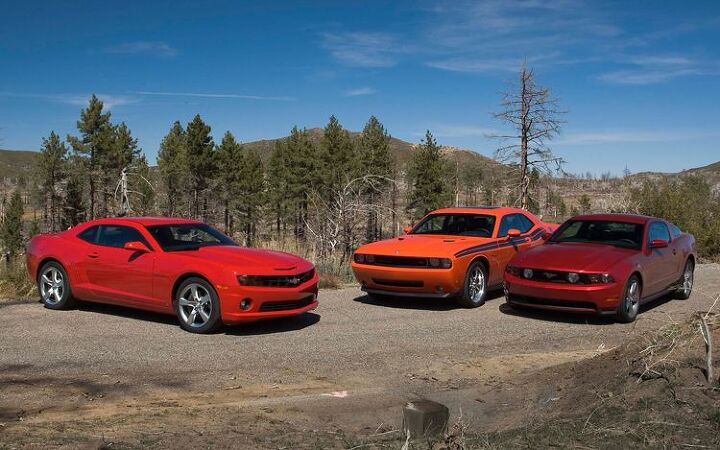Bailout Watch 453: Why, This Is Becoming Downright Political!
With what one hopes is feigned incredulity, the Freep‘s Sarah Webster marvels at how political the issue of GM’s bankruptcy has become. “I must confess,” writes Walker with a conveniently wide-eyed naiveté, “I was quite surprised when the issue of whether General Motors Corp. or Chrysler LLC should file for bankruptcy took a turn to the political when the automakers first approached the federal government for a rescue package last fall.” Yeah, it’s a shocker alright. But why is Walker so surprised?
Because most folks in Detroit have known for some time that GM and Chrysler can’t pay their own bills without federal assistance. They are, essentially, bankrupt. Consequently, they are forced to do all the things that bankrupt companies do, such as renegotiate debts, sell assets, restructure or liquidate — with or without a formal legal filing in bankruptcy court. Whether they file for court-protected bankruptcy or not, it’s pretty clear they will have to do all of the above with taxpayer cash, since banks aren’t offering risky loans anymore.
Since whether or not GM enters bankruptcy protection is “a wash” in Webster’s mind, there’s no possible reason for not supporting the fine work of funneling tax money into the whirling malestrom that is GM.
The task of praising these ongoing efforts fell to the Freep’s Tom Walsh though, whose piece lauds the panel as being “up to the task.” How does Walsh know?
It rolled out a $5-billion program last week to keep critical auto suppliers from collapsing and is expected to deliver progress reports on the status of General Motors Corp. and Chrysler LLC in the next few days, ahead of a March 31 deadline laid out in the terms of $17.4 billion in federal rescue loans to the two automakers.
And what does Walsh await from these fine public servants?
Expect acknowledgment that the companies have cut costs and made progress with the UAW. Presumably, that will be enough to allow the companies to keep the $17.4 billion they’ve already received. But future aid may be tied to completing deals with labor and bondholders… this group doesn’t seem inclined to just keep kicking the can down the road.”
Except that kicking the can down the road is exactly what Walsh is praising the PTFOA for. Allowing GM and Chrysler to keep their bailout money while kicking conditions for the first round down the road to the second round plays well in Detroit, but how does it bring the flow of federal dollars closer to an end? After all, the PTFOA’s Steve Rattner has already said that Detroit needs more than anyone has admitted so far.
Simultaneously decrying the politicization of GM’s “restructuring” while heaping praise on its most polarizing features is a delicate balancing act for even the Detroit Free Press. Especially when Ford is making all of the same union and debt reforms with no government money and more success, as witnessed by news that its debt buyback is oversubscribed.
But automotive journalists don’t earn their press junket meal tickets by cutting down the industry’s united front. Our job is to heap breathless praise on the latest pony cars a la Angus MacKenzie’s recent menáge a quatre with “the best ever pony cars.”
Except that just as the press acts as the Fourth Estate of government, checking excesses and reporting scandals, a healthily critical automotive press corps provide the tough love that automakers need to keep their sprawling businesses focused and successful.
MacKenzie, like the Freep, probably thinks of himself as the champion of the American biz when he pronounces that “20 years from now we’ll be calling these the glory days.” But by wallowing in Detroit’s muscle-bound past, Mackenzie merely flatters the worst instincts of America’s directionless automakers precisely when they need a gut check. Now, more than ever.
More by Edward Niedermeyer
Latest Car Reviews
Read moreLatest Product Reviews
Read moreRecent Comments
- Rrp138519787 If Jeep wanted to re-introduce the Wagoneer name, they just should have named the Grand Cherokee L the Wagoneer instead, and done a little bit more styling differentiation. They could have done a super deluxe version as the Grand Wagoneer. But all Wagoneers would have been the three row version as the primary product differentiation. And would cause less confusion for consumers overall.
- D The only people who have TDS, which I assume is Trump Derangement Syndrome, are the MAGOTS who have been brainwashed to love him. They Know Not What They Do.
- The Oracle The updated Model Y beat this copy to market.
- ToolGuy™ I respect what the seller is doing, but this vehicle is not for me. (Seller doesn't care, has two people lined up already.)
- SCE to AUX How well does the rear camera work in the rain and snow?


































Comments
Join the conversation
What they need to do to sell cars is use China's trick, start a new brand with new dealers and name the car Toyoda. 50% of the people buying the cars won't know the difference.
Supbad75: "away, it’s time to focus on the cars that are going to put your ledgers back in the black." @Supbad75: Sadly, if you take pickups and SUV's out of the equation, these are the only cars that stand a chance of coming close to earning a per unit profit ... and the D3 know this...